The last few minutes of “The Best of Both Worlds, Part I” are the most thrilling few minutes of Star Trek I’ve ever seen. These scenes signaled that The Next Generation was science fiction to be reckoned with.
From the moment the freshly assimilated Captain Picard turns and points his Borg eyepiece’s ominous red laser directly at us (accompanied by a mocking, minor key statement of the usually heroic Star Trek fanfare) to the tense close-up on Commander Riker as he gives the command to fire the Enterprise’s super-charged deflector dish in a last-ditch, self-sacrificial bid to stop the Borg, these three minutes perfectly cap forty-five that blend all that is best in Star Trek:
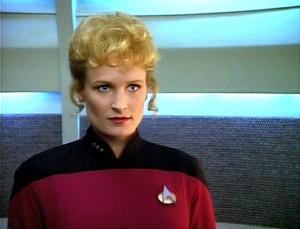 Fast-paced space action (as fast-paced as TV in 1990 could manage)
Fast-paced space action (as fast-paced as TV in 1990 could manage)- High-stakes plot
- Reflections on the human condition
- First-rate performances, especially guest star Elizabeth Dennehy’s knock-em-dead turn as the brilliant, beautiful, ambitious Commander Shelby. (If Michael Dorn ever does get his “Captain Worf” TV series, he should consider adding Shelby to the mix!
And something new: a cliffhanger ending! Trek hadn’t seen one of those since 1966, but “The Menagerie, Part I,” as good as it is, doesn’t pack the same punch.
Part One richly deserves the tributes it will get this week as it turns 25. But as I watched both parts again, for the umpity-umpth time, the truth hit me:
Part Two is the better episode.
Star Trek Sticks The Landing
What? Isn’t it an essential tenet of Star Trek fandom that Part One is TNG’s finest hour—possibly the whole franchise’s? Apparently even the late Michael Piller, who scripted both halves, found Part Two a let-down.
I don’t. Yes, it’s true that when people talk about “The Best of Both Worlds,” they talk about stuff from Part One. But the fact that they do proves how well Part Two delivers.
In Part One, TNG attempted its first spectacular vault into greatness, a routine that carried a high degree of difficulty. In Part Two, it stuck the landing.
Part Two Shook Up Trek’s Status Quo. With few exceptions, TNG, like the Original Series, hit its reset button at the end of every episode. One week’s events had no bearing on the next’s. The series took two years to mention Tasha Yar after she died, for goodness’ sake!
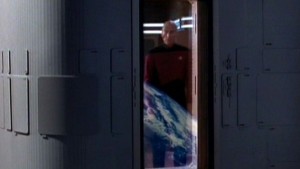 But “The Best of Both Worlds, Part II” ends with a bandaged, de-Borgified Picard casting a haunted gaze out his ready room’s window—a clear indication that this adventure counted, in a big way. As Picard’s brother tells him in the very next episode, “This is going to be with you a long time, Jean-Luc… You have to learn to live with it.” Although serialized sci-fi TV was still a few years away, such episodes as the fifth season’s “I, Borg” and the sixth-season ender/seventh-season opener “Descent” would look back to “The Best of Both Worlds.” And Picard was still “learning to live with” his time as Locutus in Star Trek: First Contact. TNG’s creative team knew that, after “The Best of Both Worlds,” neither Picard nor the Trek universe could be kept the same. Wisely, they did not try.
But “The Best of Both Worlds, Part II” ends with a bandaged, de-Borgified Picard casting a haunted gaze out his ready room’s window—a clear indication that this adventure counted, in a big way. As Picard’s brother tells him in the very next episode, “This is going to be with you a long time, Jean-Luc… You have to learn to live with it.” Although serialized sci-fi TV was still a few years away, such episodes as the fifth season’s “I, Borg” and the sixth-season ender/seventh-season opener “Descent” would look back to “The Best of Both Worlds.” And Picard was still “learning to live with” his time as Locutus in Star Trek: First Contact. TNG’s creative team knew that, after “The Best of Both Worlds,” neither Picard nor the Trek universe could be kept the same. Wisely, they did not try.
Part Two Solved A Problem In True Trek Fashion. As he wrote Part One, Piller thought he’d be leaving TNG. He relates with relish, in a DVD interview, how he painted the show’s characters into the toughest spot he could, assuming some other writer would have to paint them out. Piller claims he began Part Two with no idea how to clean up his mess.
I don’t buy it. Piller was too smart and creative, and the resolution he wrote proves how well he knew and loved Star Trek. How do our heroes save galactic civilization this time around? Not through superior firepower and Star Wars-style pyrotechnics. The Borg cube self-destructs after Data exploits the Collective’s mental link with Picard to tell it to take a nap!
Some viewers might find the ending anti-climactic; I think it’s perfect. It expresses Trek’s faith in rational and peaceful solutions. Plus, it appeals to my own faith that God uses “what is foolish in the world to shame the wise” and “what is weak in the world to shame the strong” (1 Corinthians 1:27, NRSV).
Part Two Offers Insights Into Vocation. Picard as Locutus has become the iconic face of this adventure (his ashen, cyber-“enhanced” visage graces the packaging of both the Blu-ray “feature cut” and the expanded original soundtrack album). But Will Riker is the story’s star. Over its 90 minutes, he struggles to discern his vocation, his calling—and he succeeds.
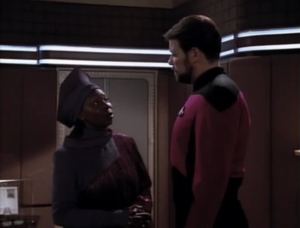 How does he do it? He checks his sense of internal call through intentional conversations with his community: with Picard, Troi, even Shelby, who’s openly after his job. After a key conversation with Guinan in Part Two, he finds the resolve to “throw away the book” and try something new. And, at the end of Part Two, he takes new responsibility for his career’s course. Does his decision to stay aboard the Enterprise (he’ll remain her first officer for a dozen more in-story years) negate his character growth? No. As he says, he now knows he has options.
How does he do it? He checks his sense of internal call through intentional conversations with his community: with Picard, Troi, even Shelby, who’s openly after his job. After a key conversation with Guinan in Part Two, he finds the resolve to “throw away the book” and try something new. And, at the end of Part Two, he takes new responsibility for his career’s course. Does his decision to stay aboard the Enterprise (he’ll remain her first officer for a dozen more in-story years) negate his character growth? No. As he says, he now knows he has options.
Riker’s dramatic arc—from anguishing over whether he has grown “too comfortable” on the Enterprise to confidently meeting the challenge of commanding in “some brilliantly unorthodox” ways—is one of the most satisfying in TNG. Frakes deserve credit for a fine performance. Piller deserves credit for pouring his own vocational struggles into the script.
Riker’s vocational wrestling reflect struggles many people face. Are we where we want to be? Are we doing what we’re meant to do? What options are open to us (not everyone’s as privileged as Riker)? Are we making the best use of them? If we’re people of faith, we must also ask whether we’re using our talents and gifts in ways that glorify God and serve our neighbor, as Christ commands us.
These are tough questions. They’re the Big Questions that Spock voices in Star Trek: The Motion Picture:
Each of us, at some time in our life, turns to someone—a father, a brother, a god— and asks “Why am I here?” “What was I meant to be?”… “Is this all that I am? Is there nothing more?”
I don’t know any Bible verses that offer easy answers. But I do believe God wants us to keep asking—and, as we ask, to keep acting. “Whatever you do, in word or deed, do everything in the name of the Lord Jesus, giving thanks to God the Father through him” (Colossians 3:17, NRSV).
Will Riker doesn’t share my Christian faith, but, in “The Best of Both Worlds, Part II,” he models one way of moving ahead even in the midst of vocational uncertainty that I think Christians can admire.
Which part of “The Best of Both Worlds” is your favorite, and why? Let’s talk in the comments!

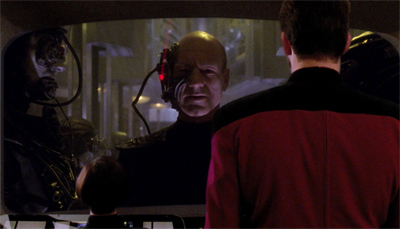
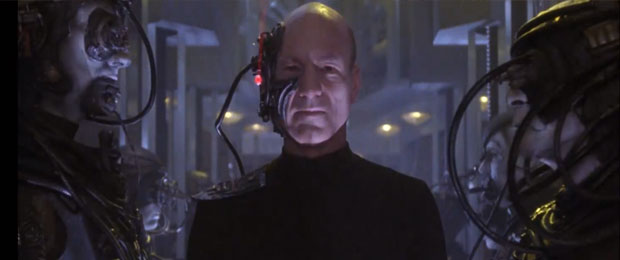
The “To be continued…” slide after the ominous “Mr. Worf, fire” was definitely a “Whaaat??” moment for the folks I was watching it with at the time. Having to wait out the summer for the resolution of, as you note, a show that had been extremely episodic, was both frustrating and a bit of fresh air.
As someone posted on Usenet back in the day (and I paraphrase), pity Commander Riker: He has no idea what to do, his captain is a Borg…and his security officer takes 3 months to fire that weapon.
Thanks for reading and commenting, Doug! I love the Usenet comment. That was an incredible summer to be a Trek fan.
“His captain is a Borg…” Indeed. I wonder if that’s true, in Riker’s mind, on some metaphorical level, too. I don’t think this is the intended reading, but maybe one reason Riker hasn’t taken his own command yet is that he sees commanding officers as Loctuses (Locutusae?): autocratic, didactic, “xyz are irrelevant, you will comply”….? What do you think, am I way off base? Probably! But it’s amusing to contemplate.
We do see some examples of Starfleet officers in TNG that don’t seem to be totally on board with Starfleet ideals, I would think Riker, having seen Picard in action, and his ability to know when to think for himself, I would think Riker would be eager to bring that to another ship.
Unless he was worried that *he* might not be the man Picard is. Yeah, could go either way.
Yes, I think one reason that subplot works so well is that it’s easy to see both sides of the argument (“You need me, particularly now” – which turned out to be dead-on- vs. “Starfleet needs good captains, particularly now”). I imagine Riker has his days, as employees generally do, when he thinks, “I could do a better job than he does!” But for all that Riker is a confident person, he also knows he can learn a lot from Picard, which is why I imagine he sticks around as long as he does.
Really, Riker’s a good example of resistance to the Peter principle, right? Our society is so quick to promote people out of jobs they’re really, really good at, when that may be just where they’re supposed to be. I assume Riker is off making a fine captain of the Titan (haven’t read the books), and making captain was always his goal; but there’s something to be said for “if it ain’t broke…,” too! Discernment is key, and I think Riker discerned his timing correctly.
This two-parter may be the best the series ever had to offer. Certainly, it’s better than any of the dreadful TNG films (including First Contact, which can only be considered good by comparison with the other films).
Picking up on the Riker thread, I really wish the films had featured him leaving the ship to complete his arc and really follow through with the trajectory Part I set up for him. I always liked Riker, but felt like it was unrealistic for him never to get his own command. Except that brief Klingon post. 😉
Thanks for the comment, Seth! I grant it’s unrealistic that Riker stuck around as first officer as long as he did, but given the constraints of episodic television at the time, it could hardly have been otherwise. What they might do today, now that prime-time drama can be more sophisticated in format, is have Riker get his own command and we could follow both the Enterprise and Riker’s ship over the course of a season, having them reunite to fight a big bad for sweeps week and whatnot. 🙂
I wonder if there was ever thought given to a Riker-centric spinoff while TNG was still running? Probably not, since DS9 was fashioned to be consciously different from the “boldly going” format. Might’ve been cool, though.
I’m curious: What are your specific issues with First Contact?
My main issue with First Contact is that it’s an action movie. The Picard we learned to love on the show wasn’t a man of action (though a few episodes showed he could hold his own), he was more philosophical and diplomatic. I wanted a slower-paced, thoughtful film. And when we got one, it was Insurrection, which sucked for a variety of other issues (including the obligatory action ending).
The Borg Queen is cool, and Alice Krige is outstanding in that role, so it’s not like I’ve got nothing good to say about the movie. And I actually enjoy it. I just don’t think it’s a particularly good movie or a good example of TNG at its best.
TL;DR version: It’s big and dumb, and we deserved more.
Most hated thing in the movie: Picard doing the Rambo scream in the Holodeck. Seriously.
Ok. I’ll give you that. But, ironically, my biggest beef with the film is the Borg Queen. Especially having just rewatched “BoBW,” it’s such a major retcon. Krige plays it well, but… it doesn’t quite work.
Yes, FC is an action film, but I don’t think it’s simply big and dumb. And as for Picard’s characterization in the movie, I think we’re seeing proof that he hasn’t resolved all the trauma from “BoBW” as he thought he had. It’s a part of his larger arc. It’s one more consequence of this tremendous story. IMO, your mileage obviously varies – thanks for the response! We’ll have to have conversation devoted to FC on the blog someday.
I have this exact dialogue with my running partner (and podcast co-host) like three times a week. Never gets old. I actually haven’t watched the film in a while.
Totally get what you’re saying about the Borg Queen. The performance won me over.